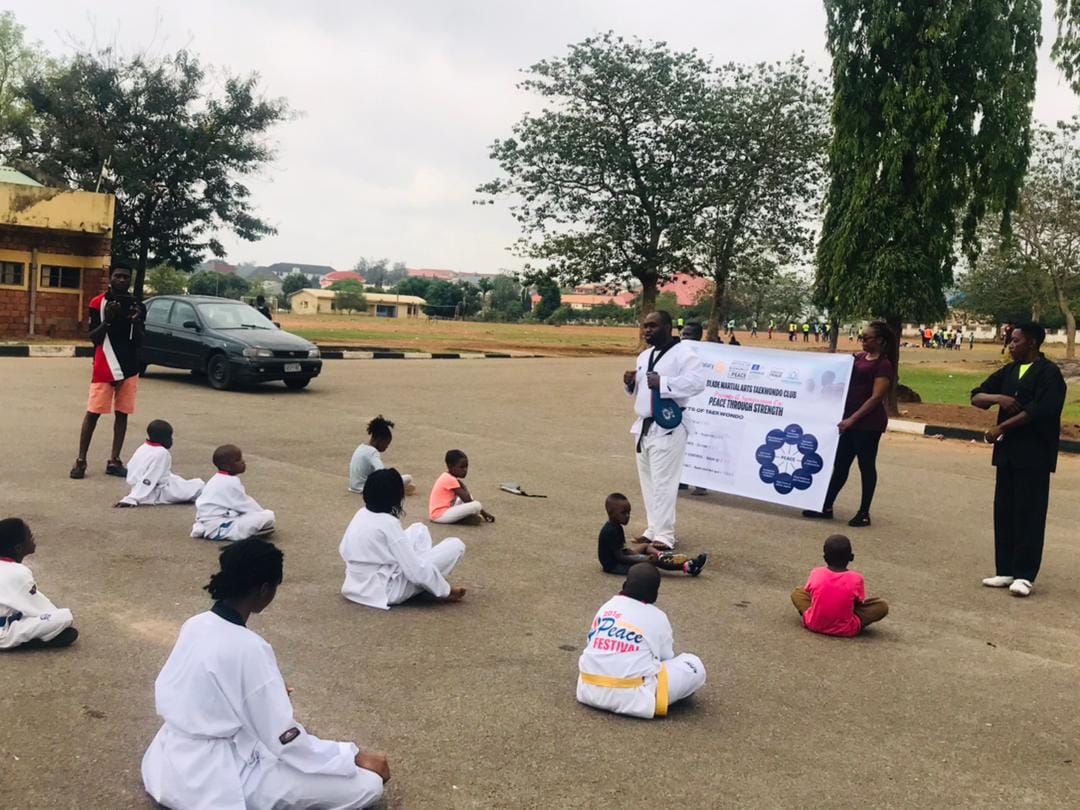One of the key aims of the IEP Ambassador Program is to introduce participants to the Positive Peace Framework. This program equips Ambassadors with an awareness of how they can use local, community-led action to move towards more sustainable, peaceful societies. Equipped with this new way of thinking, Ambassadors are tasked with designing and implementing a peace project.
Bamah Sarah Ebiseme and Bamah Francis Uchechukwa are founders of Peniel Diaconal Network International, a teaching and charitable ministry based in Abuja, Nigeria; as well as being members of their local Taekwondo dojang. These roles became the driving force behind their Peace Project, a one-day symposium about “Building peace through strength.”
During their Ambassador training, they noticed striking similarities between the eight Pillars of Positive Peace and the tenets of Taekwondo. This parallel motivated them to demonstrate how taekwondo relates to the eight Pillars of Positive Peace. They discussed how the tenets of courtesy, integrity, perseverance, self-control, and indomitable spirit correlate with the pillars of Acceptance of the Rights of Others and Good Relations with Neighbours.

A vital element of the Positive Peace Framework is the eight pillars of Positive Peace. Examples of these pillars include the Free Flow of Information, Well-functioning Government, and Equitable Distribution of Resources. Each one is interdependent on the rest. IEP has found that because of this, changemakers should address all of the pillars at once or focus on the weakest one. Sabon Ebube, the coach and founder of Blade Martial Arts Taekwondo Academy, aided Bamah and Uchechukwu in their endeavour to use sport for Positive Peace.
The workshop was held at the Government Secondary School in Karu and more than 25 people joined, with many in attendance spontaneously taking part as they watched the training unfold. The tenets of Taekwondo were displayed in Korean at the event, including the phonetic pronunciation, to pay tribute to the sport’s Korean origins. During the workshop, they delved into how an understanding of the tenets aids in building an attitude that leads to creating a peaceful society. Similarly recognising the presence, or lack thereof, of the eight pillars of Positive Peace within the community influences the presence of peace.
Positive Peace is described as the attitudes, institutions and structures that create and sustain peaceful societies. They emphasised that martial arts, including Taekwondo, does not exist for violence. Instead, it is a structure used to build a peaceful community. Understanding the Positive Peace Framework has a similar effect. The knowledge of how to effectively discern and practice the eight Pillars of Positive Peace creates a ripple effect in the community, that ultimately leads it to become a more peaceful place.
With the help of the participants, Bamah and Uchechukwu defined each of the 5 tenets of Taekwondo: courtesy, integrity, perseverence, self-control and indomitable spirit. Bamah explained, “The tenets of Taekwondo are all embedded in the eight Pillars of Positive Peace”. These descriptions illustrated the rationale behind the eight Pillars of Positive Peace to the participants.
The group described the tenet’s of courtesy as respect, integrity as honesty, perseverance as remaining practical during tough times, self-control as having restraint and calm composure, and indomitable spirit as the way of life. With each description, Bamah and Uchechukwu provided an example of how the tenet applied to daily life. They closed the session with remarks about the connection between Positive Peace and Taekwondo from Pietro Macleo, a fellow Peace Ambassador. The relationship between Taekwondo and Positive Peace was evident and caught the interest of young participants and onlookers.
As a result of the workshop, the Blade Martial Arts Taekwondo Academy has experienced a rise in its membership. Moreover, parents of the children who attended the session noticed their children actively practising Acceptance of the Rights of Others and Good Relations with Neighbours. The event gave bystanders and passersby an entirely new perspective of the sport of Taekwondo. The instructors at the Academy hope to further their community’s interest in Positive Peace, and aim to host peace festivals to demonstrate and reinforce Positive Peace with Taekwondo.
IEP Ambassador Program
Throughout the IEP Ambassador Program, participants engage in a series of webinars where they are introduced to IEP’s Positive Peace Framework. The Positive Peace Framework involves using a systems-based approach to better understand the creation and maintenance of peaceful societies.
IEP’s empirically based research teaches us that the health of a society must be understood within the broader context of its attitudes, institutions and structures. Where these are positive, they will contribute to creating a state of Positive Peace. This is as opposed to the common practice of viewing peace as being measured only by the absence of violence, also known as Negative Peace.